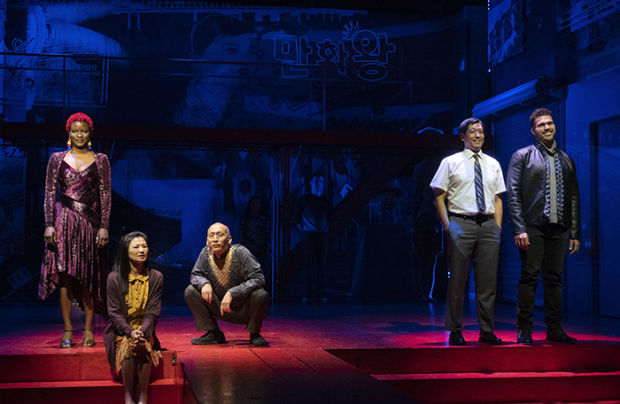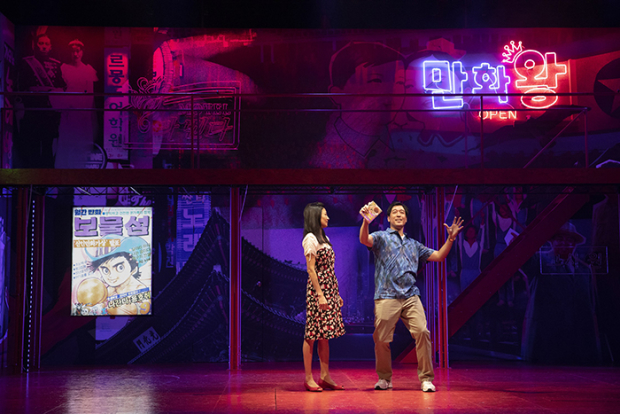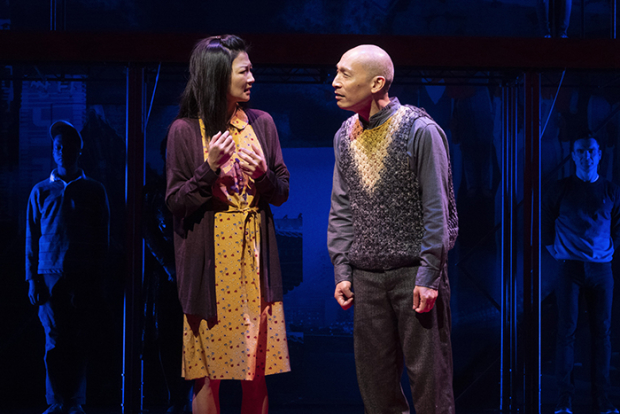Wild Goose Dreams Takes Flight at the Public Theater
Hansol Jung’s fantastical play about loneliness in the digital age opens the New York leg of its coproduction with La Jolla Playhouse.

(© Joan Marcus)
Loneliness branches in two directions in Hansol Jung's Wild Goose Dreams, now running at the Public Theater as part of a coproduction with La Jolla Playhouse. On one side we have complementary stories of separated families: A "goose dad," Guk Minsung (Peter Kim), who sends his hard-earned money (and occasionally migrates) from South Korea to the US where his wife and daughter are living for the sake of their daughter's English education; and a North Korean defector, Yoo Nanhee (Michelle Krusiec), who took her opportunity to escape, even though it meant leaving her father behind. On the other side — or rather underneath it all — there's the World Wide Web of loneliness that traps us all in a state of notification-checking paranoia, and rarely with the payoff of real human connection. Both are worthy stories, but, despite its confident plunge into the realm of magic realism, Wild Goose Dreams makes an uncertain case for how one serves the other.
Director Leigh Silverman does an excellent job articulating this world that has one foot in reality and one in fantasy — a tone set early by the Greek chorus that underscores the show with beeps, dings, zeros, and ones (set to music by Paul Castles). It's a cacophony that's as overwhelming aurally as daily Internet activity is emotionally — so naturally, we anticipate some kind of fallout from all of this empty stimulation (set designer Clint Ramos matches this sensory overload, covering the walls in neon signs, photos, and illustrations that span every genre from politics to pop culture). Fallout there certainly is, but it's due far more to the regular old injuries we personally inflict on one another than the swelling noise from cyberspace.
Of course all that clatter may give the impression of proximity, as does the global economy that allows Minsung to don his pair of New Balance sneakers (Linda Cho smartly costuming the ensemble in homogenized multinational attire). Distance, however, never fails to inflict its deafening silence, and that silence is the far more powerful presence in both Minsung and Nanhee's lives (Kim plays Minsung as a man who smiles and dad-jokes through his pain while Krusiec has a sharper, defensive edge as the self-preserving Nanhee).

(© Joan Marcus)
Sporadic phone calls and unsuccessful Facebook interactions with his Americanized daughter is pretty much all Minsung has left of his family, and until Nanhee can smuggle a phone to her father in the North, she doesn't even have that. For both, remote communication is like a Band-Aid on a gunshot wound. In each case, the wound is the more interesting story, be it the guilt building inside Nanhee for abandoning her father or the cultural and linguistic chasm widening the rift between Minsung and his family, but it's being drowned out by a stylistic choir of buzzes and beeps.
Where the Internet does play a pivotal role is in the evolving love story between Minsung and Nanhee, who meet on a dating site called Love Genie. Minsung doesn't hide his marriage from Nanhee, nor does he hide the fact that he intends to stay married. Fortunately, Nanhee doesn't seem particularly interested in making this a long-term relationship either — that is until their first sexual encounter (rather uncomfortably) makes the figment of her father (played by Francis Jue) appear to her. As Nanhee says, Minsung somehow "broke her mind" and she needs him to keep doing it to keep her hallucinations alive (a strange proposition that Minsung gets on board with a little too easily). Either way, their connection seems to be more quid pro quo than genuine: He needs to fill the void left by his absent wife and she needs to fill the void left by her absent father, a bond that's certainly understandable but doesn't inspire much romantic delight.
Then again, any relationship boiled down is some kind of quid pro quo, and the Internet is the new marketplace for such interpersonal exchange. If there's one exception to that rule, it's the bond between parent and child, which Jue enchantingly sums up in an opening monologue — an allegorical tale about an angel who has to decide whether or not to reclaim her wings. "If you have to choose between family and flying, I hope you would choose the flying," he warmly says to a young Nanhee at bedtime. Familial love and obligation is the axis on which Wild Goose Dreams spins, and a poignant one at that. If only there weren't so many competing noises knocking it out of alignment .

(© Joan Marcus)









